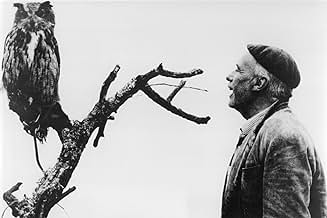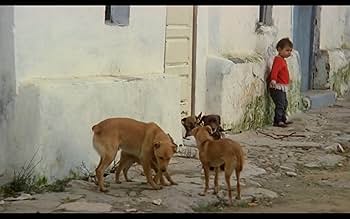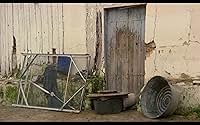Spain, 1960s. The family of poor farmers work hard in the countryside for the rich landowners who exploit them.Spain, 1960s. The family of poor farmers work hard in the countryside for the rich landowners who exploit them.Spain, 1960s. The family of poor farmers work hard in the countryside for the rich landowners who exploit them.
- Awards
- 6 wins & 4 nominations total
Pepín Salvador
- Obispo
- (as José Salvador)
Featured reviews
In the opening scenes of this movie, I couldn't tell what century it was. The peasant family living in their hovel with no electricity or running water and their subservient attitude toward the master made me wonder if this movie was taking place in the 19th century. But no, a car appeared, a model from the 1960s, so I knew that it took place in relatively recent times.
Filmed in muted, grayish tones reminiscent of a Goya painting, this film gives one an idea of what life must have been like, not only for Spanish peasants in the Franco era but also for medieval serfs and slaves in the pre-Civil War South. The master and mistress treat their own whims as more important than the peasants' needs, require them to act and speak in a subservient manner, act as if small favors are huge concessions (The family gets to move into a house with electricity!), and literally treat the men of the family as if they were hunting dogs, forcing them to fetch the game that the master spends an inordinate amount of time shooting. In one case, a man is forced to fetch while trying to recover from a broken leg. When foreign visitors criticize the master and mistress for their treatment of the peasants, they make a big show of demonstrating that the peasants are happy and can write their own names (but only because they have just been taught).
But the world is changing, and even the meekest peasant may reach his limit...
Unfortunately, this film has never been released on DVD for Region 1, and the Region 2 version is out of print, so few people will be able to see this brutal but fascinating glimpse of the twilight of an era when Spanish society was composed of countless little dictatorships.
Filmed in muted, grayish tones reminiscent of a Goya painting, this film gives one an idea of what life must have been like, not only for Spanish peasants in the Franco era but also for medieval serfs and slaves in the pre-Civil War South. The master and mistress treat their own whims as more important than the peasants' needs, require them to act and speak in a subservient manner, act as if small favors are huge concessions (The family gets to move into a house with electricity!), and literally treat the men of the family as if they were hunting dogs, forcing them to fetch the game that the master spends an inordinate amount of time shooting. In one case, a man is forced to fetch while trying to recover from a broken leg. When foreign visitors criticize the master and mistress for their treatment of the peasants, they make a big show of demonstrating that the peasants are happy and can write their own names (but only because they have just been taught).
But the world is changing, and even the meekest peasant may reach his limit...
Unfortunately, this film has never been released on DVD for Region 1, and the Region 2 version is out of print, so few people will be able to see this brutal but fascinating glimpse of the twilight of an era when Spanish society was composed of countless little dictatorships.
10erwinoz
If I would believe in a god who created man as his equal, Mario Camus would be one of the first people to come in mind to make me understand how powerful that god must be. 'Los santos inocentes' is a masterpiece of European cinema. The movie brings us back to times in Spain where most people were nothing more than property of the few rich. The 'master' even had the right to be the one to make the daughters of his serfs lose their virginity. A man and wife living such a cruel life, with trouble enough of their own, still open up their house for the wife's brother Azarias (Francisco Rabal), when he -at old age- loses his job. And Rabal gives us a performance of simplicity and joy that we will never ever forget. Although I've heard of people who found it difficult to see the beauty through all the misery, to me this is one of the most beautiful movies I've ever seen. Possibly also the very best.
The DVD I received from Corte Ingles includes a trailer for "Boda de Sangre" (Lorca) and this film is similar in spirit, but with even greater tension. This story is reminiscent of Cela's "Familia Duarte", and indeed the DVD includes a trailer to Cela's "Colmena" also, though I haven't seen that film.
I agree with the strong evaluations and comments of other viewers. I'll add that I enjoyed the handling of time in the film, through intermittent flashbacks and juxtapositions of modern elements - e.g., the automobiles driven by the landowners - with the nearly stone-age level of the protagonist family.
Yet for me, the level of dramatic tension became, frankly, too great to bear. I don't know how I could have handled it in a theater. Given I had mouse control, I interrupted it a few times for relief. Then, about two-thirds through, I forwarded the film to see the end. There are occasions when social realism can produce a tale of social horror harder to watch and bear than anything Hollywood's chainsaw boys ever dreamed of.
The acting and cinematography are excellent. I can imagine viewers trying to laugh at Azarias' (Francisco Rabal) rustic charm. His performance is unforgettable - especially as he, like a hand of fate (azar) delivers the much-needed catharsis near the end - but I, and I presume most, will surely view him as a charming and touching victim, fleeing reality to the extent his old age permits - until a certain cruel act drives him to action.
I would have preferred a balancing of the harshness of this film with more moments of beauty to serve as relief, as in the French Manon (e.g., Jean de Florette) films. But here, the actual social conditions were far harsher - "epoca negra" stuff at its worst - and I presume that to add such relief would have been untrue to history. For me, Familia Duarte and Boda de Sangre sufficed.
I will conclude in recommending some of Delibes' recent works. He has a wonderful sense of humor and a great versatility of style that enables him to relate even everyday events in the most charming and entertaining way. It's hard to believe that the same man who wrote Santos Inocentes also wrote "Diario de un Jubilado" and "Mis Amigas las Truchas" or "Las Perdices de Domingo". And hard to believe how far Spain and Europe have come.
I agree with the strong evaluations and comments of other viewers. I'll add that I enjoyed the handling of time in the film, through intermittent flashbacks and juxtapositions of modern elements - e.g., the automobiles driven by the landowners - with the nearly stone-age level of the protagonist family.
Yet for me, the level of dramatic tension became, frankly, too great to bear. I don't know how I could have handled it in a theater. Given I had mouse control, I interrupted it a few times for relief. Then, about two-thirds through, I forwarded the film to see the end. There are occasions when social realism can produce a tale of social horror harder to watch and bear than anything Hollywood's chainsaw boys ever dreamed of.
The acting and cinematography are excellent. I can imagine viewers trying to laugh at Azarias' (Francisco Rabal) rustic charm. His performance is unforgettable - especially as he, like a hand of fate (azar) delivers the much-needed catharsis near the end - but I, and I presume most, will surely view him as a charming and touching victim, fleeing reality to the extent his old age permits - until a certain cruel act drives him to action.
I would have preferred a balancing of the harshness of this film with more moments of beauty to serve as relief, as in the French Manon (e.g., Jean de Florette) films. But here, the actual social conditions were far harsher - "epoca negra" stuff at its worst - and I presume that to add such relief would have been untrue to history. For me, Familia Duarte and Boda de Sangre sufficed.
I will conclude in recommending some of Delibes' recent works. He has a wonderful sense of humor and a great versatility of style that enables him to relate even everyday events in the most charming and entertaining way. It's hard to believe that the same man who wrote Santos Inocentes also wrote "Diario de un Jubilado" and "Mis Amigas las Truchas" or "Las Perdices de Domingo". And hard to believe how far Spain and Europe have come.
10sukerman
In this film, you can see a important part of the recent history of my great country. This film is about the life in a big "cortijo" after civil war in 50-60´S, you can see the lives between rich people, like "señorito Ivan", and poor, like "Paco el Bajo", and how are the relations between this kind of people,they are near to the slavery. Besides, you can see poverty´s ravage, and the many different kind of familiar´s drama.
This intelligent drama based on a Miguel Delibes' novel and screenplay by Antonio Larreta is perfectly acted by a strong cast and masterfully directed . It depicts a brooding study about rich and poor society , making a shattering accusation against the powerful class who cares on selfish occupations more than help families in distress . Somewhere in the Extremadura region ( Spain ) , in the 60s where still rules medieval traditions , archaism and feudalism . Paco ( Alfredo Landa) and his wife Régula (Terele Pavez) along with their tree sons - one of them is backward - form a very unfortunate family . They work as tenant farmers for wealthy baron land ( Agustin Gonzalez , Agata Lys ) of a ¨Cortijo¨ . The older sons can not go to school because the ¨Señorito¨ needs their employment as servants . When Regula's brother ( Francisco Rabal) is fired by another landowner ( Jose Guardiola ) where he has worked for several years , then he settles down along with the family and the events get worse .
This over-the-top movie contains a relentless criticism to high class and the human exploitation and an attack against the rural life during the Francisco Franco time of the 60s . It's a thought-provoking drama about sacrifice, familiar love and feeling with interesting character studio of a varied assortment of individuals . It's a brilliant and touching film though sometimes is slow moving and tiring but is developed with intelligence and sensibility. In the picture are treated ethic and moral themes narrated with great sense of fairness and ductility .T his top-notch movie featuring a magnificent acting by whole casting . Awesome Alfredo Landa as the servile Paco and his wife a sensational Terele Pavez . Enticing and sensational roles with first rate performances as the cocky Señorito Ivan exceptionally acted by Juan Diego , the marchioness Mary Carrillo and her daughter played by Maribel Martin also producer along with the early deceased Julian Mateos . Of course Francisco Rabal who steals the show as Azaria always shouting : ¨ Bonita Milano¨ . Both players , Francisco Rabal and Alfredo Landa , deservedly won Ex-aequo prize the best actors in Cannes Film Festival and Prize of the Ecumenical Jury - Special Mention to filmmaker Mario Camus and the picture was Nominated Golden Palm .
Furthermore , ample shots on cloudy and nebulous skies and prairies plenty of trees filmed on location in Alburquerque, Zafra , Merida ,Badajoz, Extremadura, Spain with fine cinematography by Hans Burman . Atmospheric and evocative musical score by usual Anton Garcia Abril. This excellent motion picture is dedicated to makeup artist Julian Ruiz and stunningly directed by Mario Camus . Mario is an expert on interesting dramas as proved in ¨ The house of Bernard Alba¨ , ¨La Colmena¨ , ¨The days of the past ¨ and many others . Rating : Better than average , it's a riveting film though very depressing and downbeat . Essential and indispensable watching .
This over-the-top movie contains a relentless criticism to high class and the human exploitation and an attack against the rural life during the Francisco Franco time of the 60s . It's a thought-provoking drama about sacrifice, familiar love and feeling with interesting character studio of a varied assortment of individuals . It's a brilliant and touching film though sometimes is slow moving and tiring but is developed with intelligence and sensibility. In the picture are treated ethic and moral themes narrated with great sense of fairness and ductility .T his top-notch movie featuring a magnificent acting by whole casting . Awesome Alfredo Landa as the servile Paco and his wife a sensational Terele Pavez . Enticing and sensational roles with first rate performances as the cocky Señorito Ivan exceptionally acted by Juan Diego , the marchioness Mary Carrillo and her daughter played by Maribel Martin also producer along with the early deceased Julian Mateos . Of course Francisco Rabal who steals the show as Azaria always shouting : ¨ Bonita Milano¨ . Both players , Francisco Rabal and Alfredo Landa , deservedly won Ex-aequo prize the best actors in Cannes Film Festival and Prize of the Ecumenical Jury - Special Mention to filmmaker Mario Camus and the picture was Nominated Golden Palm .
Furthermore , ample shots on cloudy and nebulous skies and prairies plenty of trees filmed on location in Alburquerque, Zafra , Merida ,Badajoz, Extremadura, Spain with fine cinematography by Hans Burman . Atmospheric and evocative musical score by usual Anton Garcia Abril. This excellent motion picture is dedicated to makeup artist Julian Ruiz and stunningly directed by Mario Camus . Mario is an expert on interesting dramas as proved in ¨ The house of Bernard Alba¨ , ¨La Colmena¨ , ¨The days of the past ¨ and many others . Rating : Better than average , it's a riveting film though very depressing and downbeat . Essential and indispensable watching .
Did you know
- TriviaVoted eighth best Spanish film by professionals and critics in 1996 Spanish cinema centenary.
- ConnectionsFeatured in ¡Qué grande es el cine!: Los santos inocentes (1996)
- How long is The Holy Innocents?Powered by Alexa
Details
- Release date
- Country of origin
- Official site
- Language
- Also known as
- The Holy Innocents
- Filming locations
- Production companies
- See more company credits at IMDbPro
- Runtime1 hour 47 minutes
- Color
- Sound mix
- Aspect ratio
- 1.66 : 1
- 1.78 : 1
Contribute to this page
Suggest an edit or add missing content


![Watch Tráiler [OV]](https://m.media-amazon.com/images/M/MV5BMDA4ZTRjZjktOTJjYi00MGRlLWE3NDktYzgzNDAyYjk4NjY5XkEyXkFqcGdeQXRyYW5zY29kZS13b3JrZmxvdw@@._V1_QL75_UX500_CR0)




























